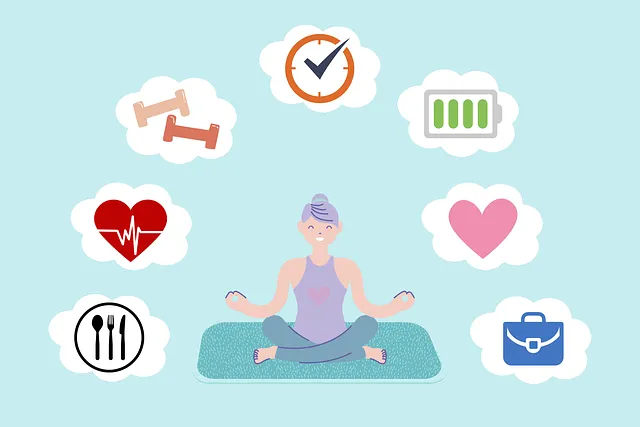Boulder Kaiser Permanente stands out for its comprehensive Boulder Kaiser Permanente mental health coverage, offering valuable resources like stress management workshops. These workshops utilize evidence-based methods such as mindfulness, meditation, and cognitive-behavioral therapy to empower individuals in managing stress, preventing depression, and fostering resilience. Through interactive sessions, diverse learning styles are accommodated, promoting community and ongoing mental well-being. The organization measures success through surveys, tracking participant satisfaction and behavioral changes, ensuring continuous improvement based on research and feedback within its Boulder Kaiser Permanente mental health coverage framework.
“Discover the power of stress management workshops as a tool for enhancing well-being in today’s fast-paced world. This comprehensive guide explores how organizations, particularly Boulder Kaiser Permanente, are revolutionizing mental health support through interactive sessions. We delve into the process of designing effective workshops, engaging participants, and facilitating meaningful interactions. By measuring success and adopting continuous improvement strategies, these programs become powerful catalysts for stress reduction. Explore the benefits and learn from Boulder Kaiser Permanente’s commitment to expanding mental health coverage.”
- Understanding Stress and its Impact on Well-being
- The Role of Boulder Kaiser Permanente in Mental Health Support
- Designing Effective Stress Management Workshops
- Engaging Participants and Facilitating Interactive Sessions
- Measuring Success and Continuous Improvement Strategies
Understanding Stress and its Impact on Well-being

Understanding Stress and its Impact on Well-being
In today’s fast-paced world, stress has become an all-too-common companion for many individuals. It’s essential to recognize that stress isn’t merely a temporary annoyance; it can significantly impact overall well-being if left unaddressed. Boulder Kaiser Permanente mental health coverage offers valuable resources to help residents navigate and manage this ubiquitous challenge. By participating in stress management workshops, individuals can gain insights into the various factors contributing to their stress levels and learn effective self-care practices (a crucial component for maintaining good mental health).
These workshops often introduce evidence-based stress reduction methods tailored to suit different lifestyles and preferences. From mindfulness techniques and meditation practices to cognitive-behavioral therapies, attendees discover a range of tools aimed at mitigating stress and fostering resilience. Moreover, such initiatives may subtly enhance awareness about potential depression prevention strategies, as chronic stress is a risk factor for developing depressive disorders.
The Role of Boulder Kaiser Permanente in Mental Health Support

Boulder Kaiser Permanente plays a pivotal role in supporting mental health initiatives within the community. As a healthcare provider, they offer comprehensive mental health coverage, addressing various aspects of psychological well-being. Their services range from individual therapy sessions to group support programs, ensuring accessibility for all. The organization prioritizes breaking down the mental illness stigma through educational workshops and outreach programs, fostering an environment where individuals feel comfortable seeking help.
Furthermore, Boulder Kaiser Permanente has initiated a Mental Wellness Podcast Series Production, leveraging digital media to reach a wider audience. This innovative approach aims to educate and inspire listeners by sharing stories of resilience and recovery. By combining traditional therapy with modern communication strategies, they contribute to the overall reduction of mental health challenges and promote a culture of open dialogue, making significant strides in the community’s mental wellness.
Designing Effective Stress Management Workshops

When designing effective stress management workshops, it’s crucial to tailor content that resonates with participants’ diverse needs and backgrounds. At Boulder Kaiser Permanente, mental health coverage plays a pivotal role in facilitating these sessions. Workshops should go beyond surface-level techniques, delving into evidence-based practices like Mindfulness Meditation and Self-Esteem Improvement. Engaging exercises, interactive discussions, and real-life application scenarios can transform theoretical knowledge into practical tools for managing stress.
Incorporating a mix of theoretical understanding and hands-on activities ensures that attendees leave with tangible strategies they can implement immediately. Facilitators should encourage open communication, fostering an environment where participants feel comfortable sharing their experiences and challenges. By combining scientific insights with a supportive atmosphere, these workshops can significantly enhance overall well-being, empowering individuals to navigate life’s stresses more effectively.
Engaging Participants and Facilitating Interactive Sessions

Engaging participants and facilitating interactive sessions are key components of successful stress management workshops. To capture and maintain interest, workshop facilitators should incorporate a mix of presentation methods, such as sharing relatable stories, utilizing visual aids, and promoting open discussions. This approach caters to various learning styles and ensures everyone feels included. For instance, incorporating activities like guided meditations or group exercises can make the sessions dynamic and memorable.
At Boulder Kaiser Permanente, mental health coverage plays a vital role in supporting these workshops. By integrating Stress Reduction Methods tailored to diverse populations, facilitators can address specific needs while fostering a safe space. Mental Illness Stigma Reduction Efforts are also integral to creating an inclusive environment where participants feel comfortable sharing their experiences and learning from one another. This collaborative approach enhances the overall effectiveness of the workshops, encouraging ongoing mental well-being.
Measuring Success and Continuous Improvement Strategies

Measuring success is a crucial step in evaluating the effectiveness of stress management workshops. At Kaiser Permanente Boulder, we utilize various metrics to assess participant satisfaction and long-term behavioral changes. This includes pre- and post-workshop surveys to gauge improvements in mental health coverage, specifically focusing on anxiety relief and depression prevention. By comparing responses, we can track the impact of our programs, identify areas for improvement, and ensure that our Mental Health Education Programs Design remain relevant and impactful.
Continuous improvement is a key principle in organizing such workshops. We analyze feedback from participants to refine our curriculum and teaching methods. Additionally, we stay updated with the latest research in mental health practices, integrating evidence-based strategies into our sessions. This iterative process allows us to adapt to evolving needs, ensuring that our anxiety relief and depression prevention initiatives remain effective and aligned with best practices within Boulder Kaiser Permanente’s mental health coverage framework.
Stress management workshops, designed with care, can significantly enhance the well-being of individuals within the community. Boulder Kaiser Permanente’s commitment to mental health support is evident through their initiatives, providing a framework for these workshops. By understanding stress’s impact and employing interactive facilitation techniques, organizations can create engaging sessions that foster resilience. Continuous improvement, measured through participant feedback and outcomes, ensures these workshops remain effective. Integrating Boulder Kaiser Permanente’s mental health coverage, these structured programs have the potential to revolutionize stress management, leaving participants with valuable tools for navigating life’s challenges.






